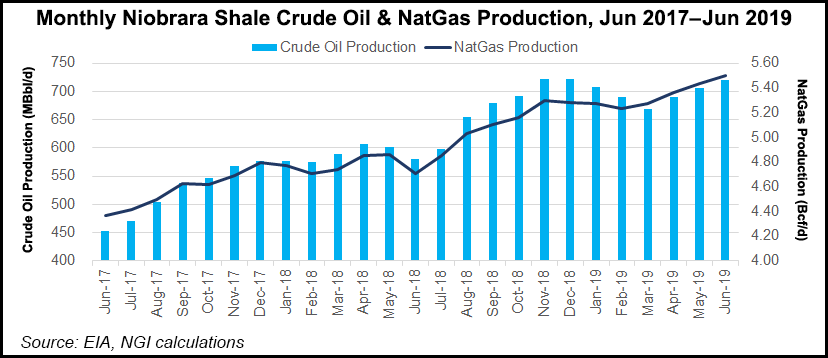Shale Daily | NGI All News Access | Regulatory
Weld County, Epicenter (and Supporter) of DJ Basin E&P, Creating Energy Department
The Weld County Commission, which was against imposing more oversight on the Colorado’s oil and gas industry, unanimously agreed to establish an energy department to solidify its commitment.

With more than 21,180 wells, Weld oil production in the heart of the Denver-Julesburg (DJ) Basin represents 88% of the state’s total output, while natural gas production represents 34%. Nearly 59% of Weld’s total assessed value comes from oil and gas production.
“This resolution sets in motion the next step toward preserving our economy and providing stability for our residents and the oil and gas industry,” said Chair Barbara Kirkmeyer. “Today is the day Weld County officially walks the walk.”
The Colorado Oil and Gas Conservation Commission (COGCC) plans to consider more than three dozen recommendations to improve well integrity and is working on multiple rulemakings to implement state Senate Bill (SB) 181, approved by voters last November. Among other things, the law gives municipalities more control over oil and gas development.
Following the vote, Kirkmeyer and former Arapahoe County Commissioner John Brackney led a group backing a proposed measure that would have nullified the law. The opponents have since retreated.
“Establishing this department is vital for the economic health of our county,” said Weld County Commissioner Pro Tem Mike Freeman. “For years, we as a county, along with our residents and the industry, have developed a process that has worked well for the needs of our community. It’s responsive, adaptable and takes into consideration our other vital industry — agriculture. We understand what works for Weld County.”
Jason Maxey, who was hired in 2018 as the county’s oil and gas specialist and local government designee, is to oversee the department, which initially would employ up to 12 people, including a director, an oil and gas planner and permitting and enforcement officers. Included would be staff to monitor air quality and other environmental factors to ensure the health, safety, and welfare of the environment and residents.
“This department will be responsible for permitting, regulating and enforcing surface and air oil and gas operations for drilling sites located in unincorporated areas of Weld County,” said Commissioner Steve Moreno. “As we have said before, we are ready to fully accept the local control provision given to us by SB 181.”
By design, the new department would set a fee and fine schedule to mitigate the financial impact to the county’s overall budget.
“The board has a long history of good stewardship with taxpayer dollars,” said Commissioner Sean Conway. “This is no exception. We are making an investment in our county by creating this department to ensure Weld County remains a great place to live, work and play.”
The county expects to officially open the department and conduct business beginning Aug. 5.
“The great thing about county government is the ability to be proactive and work in an expedient manner,” said Commissioner Scott James. “We know we are already facing economic losses as a county due to the delay of permit approvals by the COGCC since January. They haven’t even begun to make a dent in their rulemaking and procedures. Weld County, on the other hand, is ready to do business.”
Meanwhile, Boulder County commissioners in late June imposed a temporary moratorium until May 27, 2020 to accept or process oil and natural gas drilling applications until it has updated its land-use rules for energy extraction.
The unanimous decision by Boulder followed similar actions by other Colorado towns to restrict permitting and drilling following passage of SB 181.
© 2024 Natural Gas Intelligence. All rights reserved.
ISSN © 2577-9877 | ISSN © 2158-8023 |
